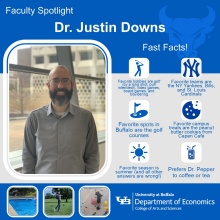Faculty Spotlight - Justin Downs
Dr. Justin Downs is a microeconomic theorist with research interests in behavioral economics, information economics, and game theory. He received his PhD in Economics from the University of Washington. You can find him teaching Introduction to Macroeconomics (ECO 181), Introduction to Microeconomics (ECO 182), Microeconomic Theory (ECO 405), Game Theory (ECO 467/567), and AI and Economic Policy (ECO 475)!

Dr Justin Downs
Why did you choose economics? Why did you choose your subfield?
JD: I chose economics because I found the way of thinking came very naturally to me and I enjoyed how economics could reveal unintuitive aspects of individual and group decision-making, and unintuitive effects of policies, laws, and institutions.
I chose to specialize in Game Theory, specifically the way informational asymmetries and frictions influence strategic situations, because I enjoyed the type of analysis done in that field, and because it seems to me that a lot of odd features of markets, organizations, and institutions arise due to informational issues. I wanted to learn more about those things and study them on my own.
What research are you working on right now?
JD: My current project has to do with the task of trying to learn someone’s expertise before hiring them to do a job.
What was your favorite paper to write, and why?
JD: My favorite paper to write (so far) was my last publication, “Screening, Overconfidence, and Competition’s Effect on Market Efficiency”. I started work on that paper as grad student under the guidance of my advisors, but my serious effort to publish came after graduating with my PhD. At that point, I made major improvements and edits to the model and the paper itself and was able to publish it in a strong journal. I am very proud of that paper and the effort I put into it.
What is your favorite class to teach and why?
JD: All my students know that Game Theory is my favorite class to teach, because the tools of Game Theory are fundamentally rather simple, but it can be applied to so many aspects of the real world. Students always provide some very interesting real-world situations for us to study in that course.
What was your favorite class as an undergrad?
JD: I loved many of my economics courses, but my favorite class was a poetry class. We read one poem a week, analyzed it, read contextual documents like information about the author, their history, the current events at the time the poem was written, and tried to understand their point of view in writing the poem.
What is your top piece of advice for your students?
JD: For 1st and 2nd year undergraduates, take as many classes as you can based on just how interesting they sound (making sure to make progress towards requirements too, of course). One of the best things about college is the opportunity to explore intellectually. There are way more things to learn out there than you probably realize.
For 3rd and 4th year undergraduates, learn how to learn in an in-depth way. You probably know what your major/concentration will be by now, so it is time to learn something deeply and really become as much of an expert in it as you can. Doing this with one thing will make it easier to do other things in the future, so even if you decide to change careers or fields, you will have the learning skills to make that transition quickly and efficiently.